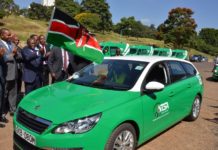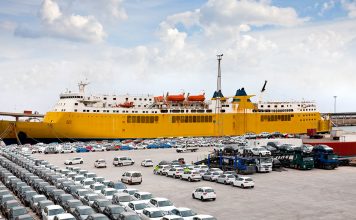Phineas Kimathi believes there is nothing under this earth that can replace the feeling of being in a race car.
The pumping heartbeat against his chest, the deafening screams from spectators as he tries to regain his grip from a skid, and the sigh of relief when he stabilises his machine is a feeling he has immortalised.
“Once you become a rally driver, it becomes an addiction that you cannot shake off,” he says.
That addiction and thrill make him believe that in a few weeks, under his guidance, Kenya will reclaim the glory of hosting the World Rally Championship.
“It has been 18 years since the World Rally Championship (WRC) left Kenya. It is time to bring it back,” he says, alluding a confidence that skeptics say might be a long shot, owing to the safety concerns raised during the safari rally event held early this month to test readiness of Kenyan roads.
Ready for safari
“He needs to work extra hard to convince the world that Kenya is ready. Reports of people dying during the event painted a wrong picture,” says Rufus Mayiera, a sports enthusiast who attended the event.
Kimathi, the CEO of the WRC Safari Rally project and chair of the organising committee, says he barely catches sleep as he thinks about strategies that would position Kenya to become a good host.
His love for motor sports started when he was barely 10. He remembers the wait – how together with his friends they would pace barefoot in Meru, waiting for Safari Rally motors to zoom past them.“We never knew specific days when the cars were scheduled to pass. We spent many days waiting by the roadside. We always got a lashing from our parents,” he says.
With his late teenage years came yet another dangerous hobby. He became a snake charmer.When the reptiles were spotted near his village, he was called to deal with them based on his interest and experience. And then things changed, creating in him a fear that he says he still carries.
“I was looking for a cobra that had been spotted around only to step on it. It struck and bit me and I was unconscious for four days,” he says.
He admits that he was scared, but little did he know that years later, he would be confronted by yet another life threatening encounter; this time with a pack of lions.The year was 1993. He was on his rally car coming from Marigat when his car developed a mechanical problem. Before then, he had met a group of rowdy youth who had stoned his car and he escaped with a crashed windscreen.
“Those days, safari rally drivers would be stoned and we would speed past the stone throwers without looking back,” he said.When his car stalled, he realised his transmission was failing and he could not call for help. He was in the middle of the bush, and when the first group of lion cubs approached his broken window, he was petrified.
“The bonnet was warm and the lions were coming to warm themselves. I have never been so scared in my life,” he says.It was 12 hours of huddling close to his co-driver and praying that the cubs would not squeeze in through the open space.By the time rescuers arrived, he was shaken, but it did not stop him from pursuing his passion as a rally driver. Even when his mother told him that every time he takes off, she goes on her knees to pray, he continued.
Toying around
“Death is not to be feared. It is inevitable and it should not stop you from doing the things you love,” he says.He started off as an hotelier and says his first job was awfully boring. He was assigned to a lodge where he was cut off from civilisation.
“I would wait for newspapers from tour guides to catch up with what was going on in the country. I resigned after a few months,” he says.He set up his tours consultancy firm that folded after the inflation that came with the elections of 1992. He then started an outsourcing food and accommodation firm that birthed the San Valencia hotels.
He started toying with the idea of doing motor sports a few years after buying his first Leon Subaru in 1992. He says when he hit the acceleration and watched it roar into life, he was convinced a new chapter has been opened.“I was 29, and everything that sparked my adrenaline was exciting,” he says with a smile.
From then, he entered many competitions and won, earning him an agreement with Mazda.“When you are in a rally car, everything stops and the focus is on you and the car. There is no time to be scared. A rally driver’s job is to manage motion,” he says when asked if there are any moments he has gotten scared while driving.
His friends admire his zeal but say his weakness is not being open to new ideas. Kimathi believes he is a little pushy, but only when he is pushing a positive agenda. Others says he is quick to anger and can sometimes hold grudges.Kimathi says they base their assessment on the stereotype that Merus have anger management issues. “I used to have anger issues, but the hotel industry tamed me. I was taught to apologise even when the customer is on the wrong,” he says. There have been accidents in his life as a rally driver, like the time his car rolled many times over in Kerio Valley.
Still, he believes rallying is in his blood. The last time he was in a race was 2012, and he says even though sometimes the road beckons, he is scared of getting hooked into the thrill of the sport.
SOURCE: standardmedia.co.ke







![Top 20 Used Cars to Avoid Buying in Kenya – [PHOTOS]](../../../blog/wp-content/uploads/2013/11/top-used-unreliable-cars-to-avoid2-80x60.jpg)


![Here are some of the best tuned cars in kenya by state of the art garages [PHOTOS]](../../../blog/wp-content/uploads/2013/11/29402_10151301757042065_340470732_n-e1384498044289.jpg)

![Top 20 Used Cars to Avoid Buying in Kenya – [PHOTOS]](../../../blog/wp-content/uploads/2013/11/top-used-unreliable-cars-to-avoid2-100x70.jpg)





